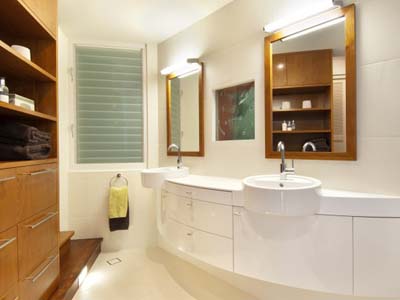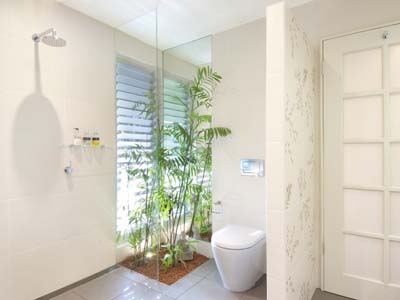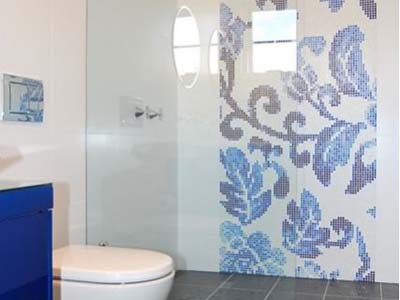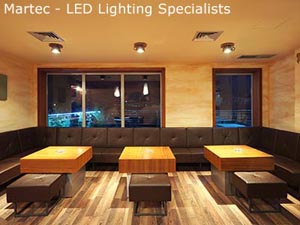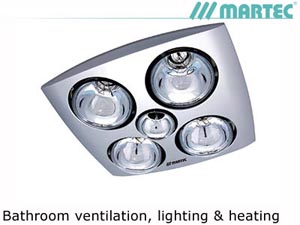Should you do-it-yourself?
DIY renovations can be a satisfying and cost saving process, but should you do it all yourself? Most DIY renovators do the project management, demolition, colour scheme selection, source the fixtures and fittings, remove and install most fittings such as hooks and towel rails and paint. However, unless they are really skilled, they contract the specialist trades of bricklaying, electrics, plumbing and tiling.
Does your bathroom need a full re-design or just a makeover?
What to do and how much to spend on your DIY bathroom project really depends on how much it is used. A family using one bathroom warrants more upgrade and facilities (like double showers & basins) than a one person bathroom.
Careful re-design can make a bathroom more spacious & provide more storage however changing the configuration costs money because it usually means new plumbing, and possibly alterations to wall construction, windows and doors.
To see whether your bathroom should be reconfigured to make it more practical, you can buy one of the many simple computer programs for creating house plans and play with different layouts. Alternatively, make paper shapes of bathroom components (to scale) and move them around a scale drawing of the room space. (Or just download our cutouts.) Once done, draw up elevations with wall dimensions and positions of existing doors and windows etc.
If your bathroom needs to be reconfigured, you may have to strip it back to the floors and walls and rebuild it from new. But if the layout is fine and the waterproofing is sound, you can renovate your bathroom relatively cheaply. A dramatic difference can be made by simply changing the colour scheme, re-tiling over the old floor tiles, replacing cabinets and replacing the toilet. There are even bathroom resurfacing products that can put a new surface over old coloured tiles or chipped and dated bathtubs.
How long do bathroom renovations take?
If you use a specialist bathroom renovation professional the bathroom is likely to be out of commission for 4 weeks. You need to find somewhere else to wash and toilet. Gyms always have good facilities that you can access casually.
Renovation legals
Whether you DIY or not, you don't need council approval to renovate a bathroom unless you significantly alter the plumbing or alter the windows. Any building work worth more than $12,000 requires home warranty insurance (in NSW).
How much will your DIY bathroom renovation cost?
Bathroom renovation costs can vary dramatically. For a medium quality upgrade, a Bathroom Renovator would charge between $12,000-15,000 for a small job or budget bathroom, $15,000 to $20,000 for a middle range renovation, with a top end from $30,000. These prices would generally include waterproofing, relocation or replacement of windows, plastering, plumbing, wiring, painting the renewal of fittings and fixtures, cabinetry additions and surfacing (eg. tiling). However by doing-it-yourself and keeping services in the same location, you could shave 20-40% of these costs. (See our bathroom cost calculator.)
It is also more cost affective if you supply your own PC items (basins, baths, taps, shower screens and tiles) whose costs vary between $3000 to $10,000 with an average of $5000. Builders usually include a provision sum to cover only the very basic of the PC range. With good research reasonably priced PC items that look great can be found. You can make huge savings by buying tiles and PC items from alternative sources like auctions, sales, the paper and also ebay.
There are always extras in any renovation and especially so when renovating a bathroom. Expect to add 10-15% to your budget for unexpected problems and moments where you go over the top.
Video about bathroom costs
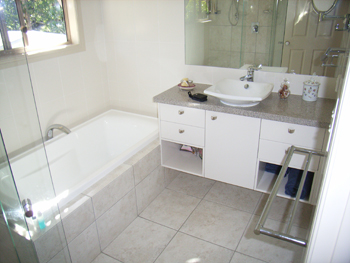
The fabrication sequence
The usual sequence when renovating a bathroom is
- Strip-out (with pipes sealed)
- Rough-in of plumbing and electrics
- Rendering walls
- Waterproofing
- Fit-out for shower, vanity, bathtub and toilet
- Tiling
- Shower screen installation
- Final electrical wiring
- Final plumbing
- Vanity and bench tops installation
- Tap installation
- Painting
It's best to consult trade's people about how and where to waterproof. Waterproofing usually costs between $600 and $1000. In older homes not all areas were waterproofed and problems can arise. You can remove tiles and waterproof and re-tile, or waterproof with old tiles in situ. The building code requires only the shower area to be waterproofed, but plenty of builders recommend spending more money and waterproofing a large portion (or all) of a bathroom.
Working with trades
Be clear on what you're expecting each tradesperson to do (and for how much) before finalising contracts and them starting work. Make sure you organize trades people in the correct order otherwise there may be costly revisits, extra work and additional costs. Also check fittings with relevant trades before buying them otherwise they may have to make changes to their preparations. It's also wise to check contractor's work or ask for references. They should be industry qualified, licensed and insured. You can ascertain their license on FairTrading.nsw.gov.au (or the appropriate government department in your state).
Renovating your own bathroom can save you quite a few thousand dollars but it needs some skill, motivation and time. It can also be extremely satisfying, especially given that we all tend to spend so much time in our bathrooms - you really get to appreciate and be proud of your own work and creative decisions. Keep in mind that whether you do-it-yourself or hire someone the project will usually not go completely smoothly. There is likely to be some unexpected difficulty that will frustrate the daylights out of you. But you will eventually deal with it and move on to the next step. That's the nature of building (and life).


